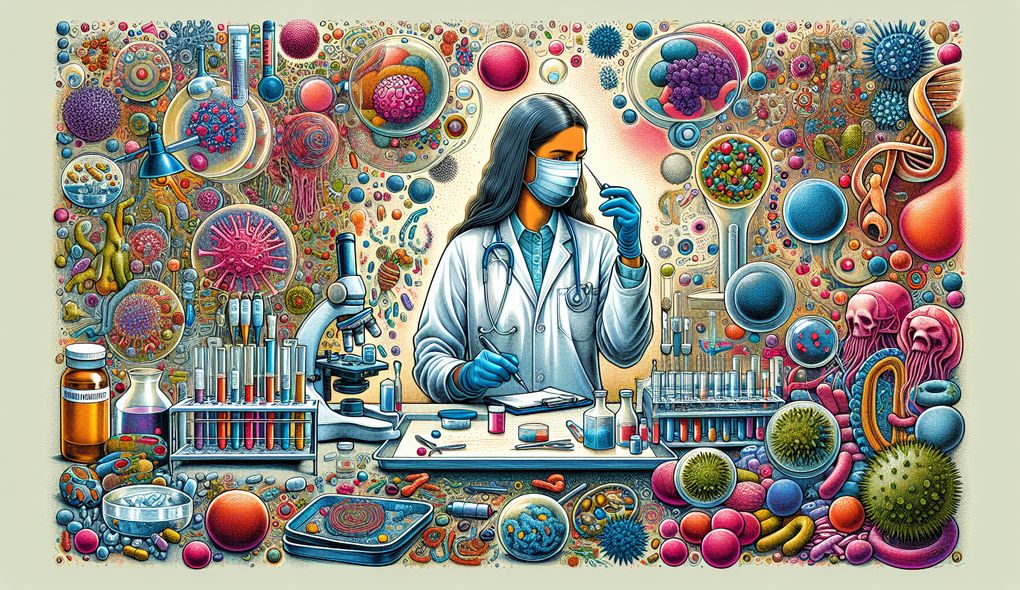Can you explain the diagnostic and therapeutic procedures related to allergy and immunology?
JUNIOR LEVEL

Sample answer to the question:
Yes, in allergy and immunology, we use various diagnostic procedures to identify allergies and immune disorders. This includes conducting patient interviews to understand their medical history, performing physical examinations, and ordering diagnostic tests. These tests can include blood tests, skin prick tests, and lung function tests. Once a diagnosis is made, we develop personalized treatment plans for patients, which can include medication, allergen avoidance strategies, and immunotherapy. It is important to stay up to date with the latest research and treatment protocols in order to provide the best care to our patients.
Here is a more solid answer:
In allergy and immunology, diagnostic procedures involve a comprehensive approach to identify allergies and immune disorders. We begin by conducting thorough patient interviews to gather their medical history and understand their symptoms. Physical examinations are performed to look for specific signs, such as skin reactions or abnormal lung sounds. Diagnostic tests, such as blood tests, skin prick tests, and lung function tests, are also utilized to confirm the diagnosis. Once a diagnosis is made, we develop personalized treatment plans based on the patient's specific needs and goals. This can involve prescribing medication, providing recommendations for allergen avoidance, and considering the use of immunotherapy. It is crucial to interpret clinical and laboratory data effectively in order to make accurate diagnoses and provide optimal treatment.
Why is this a more solid answer?
The solid answer expands on the basic answer by providing more details on the diagnostic procedures used in allergy and immunology, as well as emphasizing the importance of interpreting clinical and laboratory data.
An example of a exceptional answer:
In the field of allergy and immunology, diagnostic and therapeutic procedures play a crucial role in providing comprehensive patient care. Our approach begins with in-depth patient interviews and meticulous documentation of their medical history, including details of any allergic reactions or immune disorders. Physical examinations are conducted, focusing on specific areas or organs relevant to the patient's symptoms. To confirm the diagnosis, we use a range of diagnostic tests, such as blood tests to measure specific antibodies or cytokine levels, skin prick tests to identify specific allergens, and lung function tests to assess respiratory function. Careful interpretation of clinical and laboratory data is vital to ensure accurate diagnoses and appropriate treatment plans. The treatment plans we develop are highly individualized, taking into account the patient's medical history, lifestyle factors, and treatment preferences. This can involve prescribing medication, providing guidance on allergen avoidance strategies, and offering immunotherapy options. We also place great importance on patient education, ensuring that patients and their families have a comprehensive understanding of their condition and the necessary management strategies. By staying up to date with the latest research and treatment protocols, we continuously enhance our expertise and provide the best possible care to our patients.
Why is this an exceptional answer?
The exceptional answer provides a comprehensive overview of the diagnostic and therapeutic procedures used in allergy and immunology. It emphasizes the importance of patient interviews, documentation, and the careful interpretation of clinical and laboratory data. The answer also highlights the individualized approach in developing treatment plans and the commitment to patient education. Additionally, it stresses the importance of ongoing professional development in order to provide the best possible care.
How to prepare for this question:
- Review the basics of allergy and immunology, including common allergens, immune responses, and diagnostic techniques.
- Stay updated with the latest research and treatment protocols in the field of allergology and immunology.
- Practice interpreting clinical and laboratory data to enhance diagnostic skills.
- Develop effective communication skills to educate patients and their families about allergy and immunology health management.
- Prepare examples of past experiences where you successfully diagnosed and treated patients with allergies and immune disorders.
What are interviewers evaluating with this question?
- Knowledge of diagnostic and therapeutic procedures related to allergy and immunology

